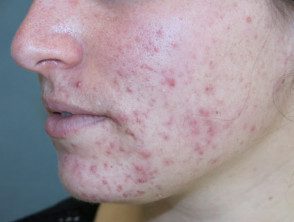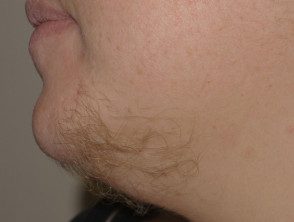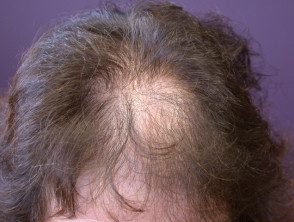What is hyperandrogenism?
Hyperandrogenism describes an excessive circulating man sex hormonetestosterone) in women and its effects on the body.
What causes hyperandrogenism?
High levels of circulating male sex hormones in women can arise from:
- Ovarian disease
- Polycystic ovary syndrome
- Benign (no-invader) or evil one (cancerous) ovarian tumors
- Adrenal gland disease.
- Partial deficiency of the adrenal gland. enzyme 21-hydroxylase (late-onset CYP21A2 deficiency) and other forms of congenital adrenal hyperplasia
- Benign or malignant adrenal tumors.
- Disease of the pituitary gland
-
Cushing's syndrome due to excess adrenocorticotrophic hormone (ACTH)
-
Acromegalygiantism) due to excess growth hormone and insulin-I like it growth factor (IFG-1)
- Prolactinoma, a tumor that produces prolactin, since prolactin stimulates the adrenal gland
-
- Obesity and metabolic syndrome - more androgens are produced by the adrenal glands and in body fat in response to the release of insulin and IFG-1, and less vitamin D is produced in the skin
-
Medications that can cause acne, including testosterone, anabolic steroids, and recombinant human IGF-1.
The mechanisms that result in hyperandrogenism may involve:
- High general levels of circulating testosterone
- Normal general testosterone but increased free testosterone, due to low levels of sex hormone binding globulin (SHBG, the protein that transports testosterone in the blood). Normally there is little free testosterone circulating in the blood since testosterone is strongly bound by SHBG
- More active conversion of weaker androgens to stronger androgens such as dihydroxytestosterone (DHT) by the enzyme type 1 5-alpha-reductase within sebaceous gland
- Adrenal steroids are converted first to androstenedione by 3-beta-hydroxysteroid dehydrogenase, and then to testosterone by 17-beta hydroxysteroid dehydrogenase.
- The increased sensitivity of the skin to DHT
- Effects of insulin and IGF-1
What are the effects of hyperandrogenism?
Hyperandrogenism can lead to any or all of the following:
-
Seborrhea (oily skin)
- Acne
- Hidradenitis suppurativa
- Hirsutism
-
Female pattern baldness (alopecia)
- Male pattern baldness in females
- Irregular menstruation
- Male appearance with increased muscle mass and decreased breast size
- Voice deepening with prominent larynx (voice box)
- Increased clitoris associated with increased libido (virilization)
- Sterility
- Associated type 2 diabetes due to insulin resistance.
- Obesity
Signs of hyperandrogenism

Acne

Hirsutism

Pattern alopecia
What tests are necessary to confirm hyperandrogenism?
If there are symptoms or signs suggesting hyperandrogenism, base Laboratory investigations can be helpful in identifying the exact cause.
- Blood tests to detect hormones:
- FSH (follicle stimulating hormone)
- LH (luteinizing hormone)
- Estradiol
- Prolactin
- Testosterone
- SHBG (sex hormone binding globulin)
- 17-hydroxyprogesterone
- DHEAS
- Thyroid function.
- Pelvic ultrasound scan to evaluate ovarian cysts
The oral contraceptive should be discontinued 6 weeks before the test. The ideal time is in the first 3 days of the menstrual period and the sample is best taken on an empty stomach.
High testosterone suggests that an ovarian source may be responsible for the signs of hyperandrogenism. If testosterone levels are only slightly elevated, consider polycystic ovary syndrome, if they are markedly elevated, consider an ovarian tumor.
Elevated DHEAS suggests an adrenal source, and an elevated 17-hydroxyprogesterone level suggests congenital adrenal hyperplasia.
My test results are normal. Why do I have acne / hirsutism?
Most women with acne / hirsutism have hormone levels similar to unaffected women. This indicates that your acne / hirsutism is not due to disease of the ovary, adrenal gland, or pituitary gland.
Some women have more activity of the 5-reductase enzyme within their sebaceous glands. This leads to more male hormone dihydrotestosterone within the cell, which can explain acne and hirsutism. Other causes of acne include hereditary and environmental factors.
Should I consult a hormone specialist?
Most women with acne and / or hirsutism can be managed by a GP / GP or by a dermatologist.
Patients with acne and significant menstrual disorders, severe hirsutism, suspected Cushing's syndrome or acromegaly, total testosterone of> 5 nmol / L, or other hormonal abnormalities are best to consult. endocrinologist (hormone specialist).
Hormonal therapy
Treatment for acne patients includes current anti-acne agents, oral antibiotics such as tetracycline, anti-androgens (hormone therapy, including childbirth control pill) and oral isotretinoin. These can be used successfully in patients with and without hyperandrogenism.
Most women with hirsutism use physical methods of hair elimination and you can take the contraceptive pill.
However, when acne and / or hirsutism do not respond to conventional therapy due to hormonal imbalances, they are more potent antiandrogens It can be considered.
